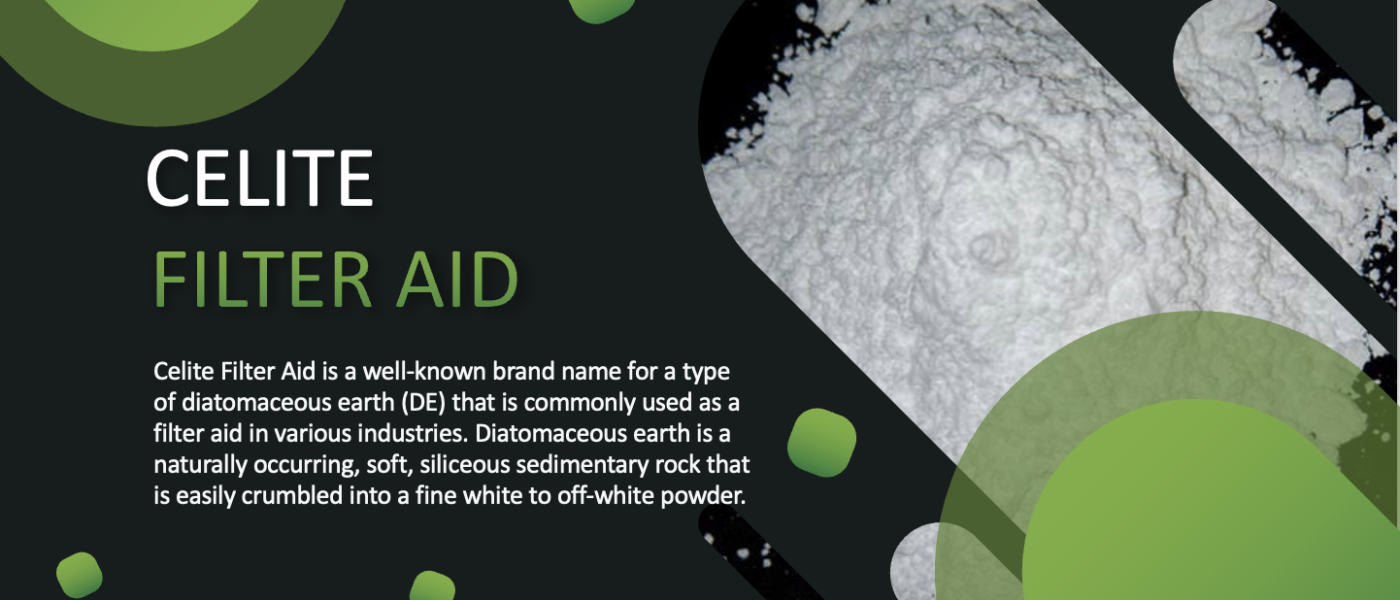Celite Filter Aid
Celite Filter Aid is a well-known brand name for a type of diatomaceous earth (DE) that is commonly used in various industries. Diatomaceous earth is a naturally occurring, soft, siliceous sedimentary rock that is easily crumbled into a fine white to off-white powder. It consists of the fossilized remains of diatoms, a type of hard-shelled algae. Celite are widely recognized for their effectiveness in improving filtration processes.
Key Features of Celite Filter Aid:
- Composition:
- Celite is primarily composed of amorphous silica (SiO₂). It has a high porosity and surface area, which makes it an excellent filter aid capable of trapping fine particles while allowing the liquid to pass through.
- Physical Properties:
- Porosity: The structure of Celite is highly porous, allowing it to filter very fine particles efficiently.
- Lightweight: Celite is lightweight, which makes it easy to handle and use in filtration systems.
- Chemically Inert: Celite is chemically inert, meaning it does not react with the substances being filtered, making it suitable for use in sensitive applications like food and beverage processing and pharmaceuticals.
- Types of Celite Filter Aids:
- Celite filter aid are available in various grades and particle sizes, depending on the specific filtration requirements:
- Coarse Grades: Used for rapid filtration with less clarity.
- Fine Grades: Used for applications requiring high clarity and fine filtration.
- Calcined Grades: These grades are heat-treated to increase hardness and filtration efficiency, commonly used in high-temperature applications.
- Celite filter aid are available in various grades and particle sizes, depending on the specific filtration requirements:
- Applications of Celite Filter Aid:
- Food and Beverage Industry:
- Used extensively in the clarification of beverages such as beer, wine, and fruit juices to remove suspended solids, yeast, and other impurities, ensuring a clear final product.
- Pharmaceutical Industry:
- Employed in the filtration of pharmaceutical products, including liquid drugs, vaccines, and active pharmaceutical ingredients (APIs), where purity is critical.
- Chemical Processing:
- Celite is used in chemical filtration to purify acids, alkalis, and solvents by removing fine particulate matter.
- Water Treatment:
- Applied in the filtration of water to remove contaminants, suspended solids, and turbidity, making it safe for consumption or industrial use.
- Industrial Applications:
- Used in the filtration of oils, syrups, and other viscous liquids to improve product clarity and quality.
- Food and Beverage Industry:
- Benefits of Using Celite Filter Aid:
- Enhanced Filtration Efficiency: Celite’s high porosity allows for the efficient removal of fine particles, leading to clear and pure filtrates.
- Protection of Filter Medium: Celite acts as a protective precoat on the filter medium, preventing clogging and extending the life of the filter.
- Cost-Effectiveness: Celite filter aids are relatively inexpensive and can be used in various filtration systems, providing a cost-effective solution for many industries.
- Versatility: Celite is versatile and can be used in a wide range of applications, from food processing to industrial filtration.
- How to Use Celite Filter Aid:
- Precoat Formation: A slurry of Celite is prepared and circulated through the filtration system to form a precoat layer on the filter medium. This layer traps impurities during the filtration process.
- Filtration Process: Once the precoat is formed, the liquid to be filtered is passed through the Celite layer, which captures fine particles and clarifies the liquid.
- Filter Cake Removal: After the filtration cycle, the filter cake (accumulated solids) is removed, and a new precoat layer may be applied for the next cycle.
- Environmental and Safety Considerations:
- Non-Toxic and Environmentally Friendly: Celite is considered safe for use in food and beverage applications. However, care should be taken to avoid inhaling dust during handling, as prolonged exposure to respirable crystalline silica can cause lung damage.
- Disposal: Celite can be disposed of in accordance with local regulations. It is generally considered non-hazardous waste but should not be released into the environment in large quantities.
Conclusion:
Celite filter aid is an essential component in various filtration processes across industries. Its unique properties, such as high porosity, lightweight structure, and chemical inertness, make it ideal for achieving high filtration efficiency and product clarity. Whether in the food and beverage sector, pharmaceuticals, water treatment, or industrial processes, Celite filter aids provide a reliable and cost-effective solution for improving the quality and safety of filtered products.
